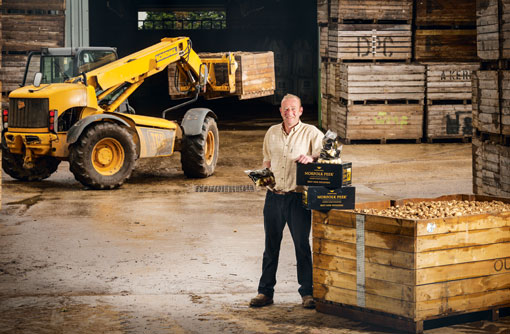Arable Farmer Awards shortlist: William Gribbon

All three finalists started out from humble beginnings and have built up profitable arable enterprises. The key to their success has been a focus on costs and identifying a gap in the market, such as offering a premium seed potato service or establishing their own-brand new potatoes or mini-carrots. Richard Allison reports
Adding value by direct-selling branded new potatoes to consumers is one of William Gribbon’s solutions for the predicted cut in single farm payments after the 2014 CAP reforms.
“Many will get a shock with their single farm payments,” says William, who is already making plans to recoup some of the potential loss of SFP.
His approach is to maximise the “three Ms” – men, machinery and margins. “Tractors are typically clocking up about 2,500 hours a year and there are no slack weeks.
“Even around Christmas, potatoes are coming out of the store,” he adds.
His replacement policy is to sell tractors after four years. The whole farm is GPS-mapped and RTK guidance is used to maximise machine efficiency. This has reduced diesel use and cut input costs by eliminating overlap.
Farm Facts
- Total area of 2,300 ha of which 2,000 ha is in arable production
- Farming across six sites with mix of tenancy and contract farming agreements
- 10 full-time staff
- Cropping: potatoes, sugar beet, winter wheat, oilseed rape, rye, herbage, spring and winter barley
To maximise margins, his focus is on adding value. This includes renting out land to a neighbour for carrot growing and to British Quality Pigs. “Outdoor pigs follow potatoes in the rotation as they are good at controlling volunteers.”
Pigs and carrots coupled with potatoes and sugar beet widen the rotation putting less pressure on cereals. This means he can grow barley for C1 seed production.
New this year is herbage seed, which joins rye in the rotation. “Bog-standard crops don’t make money, so we have got to try other crops.”
But the biggest success in adding value is the launch of the Norfolk Peer brand.
“At £280/t, I questioned why we were giving them [new potatoes] away and wanted to do something about it. So we decided to get closer to the end consumer and create more value from the crop.”
He spent the past two years creating the premium-branded product Norfolk Peer new potatoes, with its distinctive gold lettering on a black background to emphasis its credentials. Also important is the “localness”, hence the name Norfolk Peer.
“We adopted this variety as it repeatedly came out top in taste tests. Yields are lower at 12t/acre compared with 25-26t/acre for processors such as Roosters.”
William is now supplying 22 local Asda stores and is also selling at New Covent Garden market, as well as having his brand sold in Fortnum & Mason last year.
The judges liked
- Planning ahead, post CAP reform
- Adding value to potato crop
- New use for redundant sheds
- Focusing on soil organic matter
“It’s only a small tonnage, but it is already having a large impact on the weekly margins.” His goal is to increase the area to 240ha and launch new lines, the next being Norfolk Bakers.
His aspirations don’t stop there, he is looking at creating a potato-based lunchtime snack, breaking into the city snack market.
Another move to help compensate for the reduction in SFP after 2014 is the investment to convert redundant cattle sheds into extra potato storage. He estimates this will generate an additional £100,000 margin each season.
Much of his growing area is free- draining sandy soils. While this is ideal for harvesting in wetter conditions and for outdoor pigs, it means effective management is crucial to avoid loss of structure.
With soil undergoing two passes of stone separation in each five-year rotation, he is looking to get humus back into soils by adding compost and poultry manure. “We need to get some body back into the soil.”
Another soil issue is potato cyst nematode. “Biofumigant mustard crops are drilled after cereals and incorporated before planting.”
Tony has, over the past 30 years, planted about two acres of trees per year and hedge planting is ongoing, with nearly 100ha taken out of production to allow natural habitat areas to thrive.
“Water is our scarcest and most unpredictable natural resource. Continued investment plus the use of rain sensors ensure water is available and is used efficiently.”
He places a high value on his staff, supporting them with ongoing training to expand their skills as well as his focus on safety, using an external company to audit standards and performance. “Farming can be a dangerous business, so the health and safety of staff is paramount.”
A word from our sponsors
 British Sugar produces over 1m tonnes of sugar from the 8m tonnes of sugar beet grown in the UK by 4,000 farmers. The industry is dedicated to maximising the production of the crop as well as the four sugar factories to enable a sustainable future.”
British Sugar produces over 1m tonnes of sugar from the 8m tonnes of sugar beet grown in the UK by 4,000 farmers. The industry is dedicated to maximising the production of the crop as well as the four sugar factories to enable a sustainable future.”
Paul Bee, British Sugar
Read more
Find out more about the 2012 Farmers Weekly Awards including details on how to book tables for the event’s glittering London awards bash

